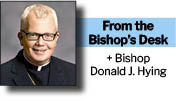
Autumn is my favorite season of the year. The frosty temperatures, the blazing color of the trees, the smell of wood smoke, and the crunch of leaves underfoot are all expressions of beauty and peace.
Nature teaches us at this time the gift of surrender as we savor the sweet melancholy of another summer gone and watch the leaves tumble down in a shower of bright hues.
Autumn teaches us to let go, to detach, and to hand our lives over to the Lord again and again, just as a green and vibrant leaf loses its vitality and leaves its attachment to the tree.
Embracing detachment
In his Spiritual Exercises, St. Ignatius of Loyola wrote much about detachment, asserting that, as followers of Christ, we should not prefer riches to poverty, health to sickness, or comfort to suffering, but rather seek to embrace the will of God in whatever befalls us.
To embrace such a spiritual vision is impossible without supernatural grace, because who wants to be poor, sick, and in pain?
If we seek holiness and freedom in Christ, however, we must come to a point of accepting God’s will in the big and small details of our lives as we find them to be.
Being human, we are attached to many people and things.
The people we love, the home we enjoy, the friends that we cherish, the work that satisfies, the health that allows us to flourish, the money that gives us financial security, and even our concept of God — we cling to all of this, often without even thinking about it.
How to handle loss
What happens to us then, when we lose someone or something that we are fondly attached to, or when we do not get something we passionately want?
We inevitably go into mourning, sadness, and even anger, often at God, whom we feel has let us down. We rail against His passive will.
“How could you let this happen, Lord? Do you really love me? Do you care?”
Such dynamics are inevitable as we grow in the spiritual life, but with time, prayer, maturity, and wisdom, we gradually come to realize some important truths.
All things but God are temporal and passing so in the end, we must let go of everything.
God truly knows what is best for us, so even the “bad” things that happen have some spiritual purpose in our journey to Heaven.
Every setback and loss are golden opportunities to grow in faith, trust, and freedom, as we will what God wills.
This growth is the hardest thing for us, but is necessary if we truly seek to become holy.
I found this quotation from Fr. Jacques Philippe in October’s Magnificat to be profoundly helpful in understanding all of this.
“Consider Jesus’ words: No one takes my life from me, but I lay it down of my own accord. Here is a paradox. His life was certainly taken from Him: He was put in chains, condemned, led to Calvary, and crucified. But this was a death He freely accepted. In His heart was deep acceptance of what His Father wanted.
“Jesus remained supremely free in His death because He made it into an offering of love. By His free and loving consent, the life that was taken became a life given.
“Our freedom always has this marvelous power to make what is taken from us — by life, events, or other people — into something offered.
“Externally there is no visible difference, but internally everything is transfigured: Fate into free choice, constraint into love, loss into fruitfulness. Human freedom does not confer the power to change everything, but it does empower us to give a meaning to everything . . .We are not masters of the unfolding of our lives, but we can always be masters of the meaning that we give them.
“Our freedom can transform any event in our lives into an expression of love, abandonment, trust, hope, and offering.
“The most important and most fruitful acts of our freedom are not those by which we transform the outside world but those by which we change our inner attitude in light of the faith that God can bring good out of everything without exception.”
In such incisive thoughts, Father Philippe reminds us that we cannot control what happens to us, but we can control how we respond to it, how we embrace it, and the inner freedom of acceptance that we apply to it.
Admittedly, this spiritual stance is very difficult to do, but we follow the Master, who in the Garden of Gethsemane, sweated blood and prayed that the Chalice of the Passion would pass Him by.
Yet, Jesus ended this prayer to the Father with, “But not my will, but yours be done.”
Finding freedom
Our salvation was assured in that precise moment when the Son made the will of the Father His own and embraced the mystery and terror of the Cross, for our sakes.
When we can detach from all earthly things and dwell in the Heart of Christ, we can come to that freedom that the Lord discovered on the Cross.
Crucified and dying, Jesus never looked less powerful or consequential but nailed to the wood, He was never more free, for He had surrendered Himself into the loving arms of the Father.

